Wednesday, December 5, 2012
1911-12 Montreal Wanderers Riley Hern Jersey
Born on this date in 1880, Riley Hern played both goaltender and forward as a youth but settled on goaltending by the time he progressed to senior hockey with the Stratford Legionnaires of the Ontario Hockey Association from 1898 to 1901.
He turned professional in 1901 with the Pittsburgh Keystones of the Western Pennsylvania Hockey League, which he led in victories with 9 in his first season. After going five-for-five in wins the next season, he suffered a dismal 1-10 slog through the 1902-03 season.
Looking for greener pastures, he found one in Houghton, Michigan with the Portage Lake Hockey Club. Not a member of any established league at the time, Portage Lake played a schedule of exhibition games to great success, as Hern finished the season with an outstanding record of 15-1.
The 1903-04 Portage Lake Hockey Club
With the stellar lineup of talent Portage Lake had assembled, which included future Hall of Famers "Bad" Joe Hall, Bruce Stuart, his brother Hod Stuart and the legendary Cyclone Taylor, thanks in no small part due to the salaries the club was paying in what was still primarily an amateur sport, Portage Lake became members of the International Professional Hockey League for it's inaugural 1904-05 season. After a second place finish in year one, Portage Lake won the league title in 1905-06 as Hern posted a 15-5 record.
He moved east for the 1906-07 season to join the current Stanley Cup holders, the Montreal Wanderers, who were members of the Eastern Canada Amateur Hockey Association at the time. Before the season began the Wanderers faced a Stanley Cup challenge from the New Glasgow Cubs, who they turned back in a two-game, total-goal series with scores of 10-3 and 7-2 to retain the cup by a total of 17-5.
Hern and the Wanderers then lost control of the cup on January 21st when the Kenora Thistles wrested the cup away with 4-2 and 8-6 wins.
After their surprising defeat, the Wanderers marched unchallenged through the ECAHA schedule, finishing with a flawless 10-0 record on the back of 105 goals scored while giving up just 39, which calculates to an average of a 10-4 win every game. As champions, and also on a roll having posted goal totals of 16, 13, 18, 10 and 16 in their last five games, the Wanderers attempted to reclaim the cup by traveling west to challenge Kenora for the rights to the Stanley Cup.
With the first game delayed a day due to bad ice conditions which forced a change in venue from Kenora to Winnipeg, Hern and the Wanderers all but reclaimed the cup during Game 1 with a 7-2 win. Kenora hung tough and won the second game 6-5, but failed to overcome the five goal deficit they faced after Game 1. With the Wanderers taking the series 12 goals to 8, they returned to Montreal with the cup in hand, only to have it stolen and held for ransom!
The 1907 Montreal Wanderers
Following a team photo, the cup was taken from photographer Jimmy Rice's homeand when no one would pay for it's return, the Stanley Cup was left on Rice's doorstep and his wife used it as a geranium planter until the fall when it was put back into service!
At some point during the time between winning the cup, having it stolen, it being used as a planter and the next cup challenge, the Wanderers had the audacity to not only engrave the name of their team into the cup, but the entire roster of the club, beginning a tradition which many feel makes the Stanley Cup the greatest trophy in sports.
The 1907 Wanderers celebratory engraving in the bottom of the bowl of the Stanley Cup
For the 1907-08 season, the Wanderers had to defend the cup against the Ottawa Victorias, whom they easily turned back 9-3 and 13-1. Following the regular season, where the Wanderers again emerged as league champions, they were challenged for the cup twice more, first by the Winnipeg Maple Leafs, who they beat 11-5 and 9-3, and then by the Toronto Professionals in a one game playoff the Wanderers won by a score of 6-4, which gave Hern a 13-2 record for the season.
The 1908 Montreal Wanderers
Once again, prior to the 1908-09 season, the Wanderers face yet another challenge for the Stanley Cup, this one from the Edmonton Hockey Club, a team stocked with ringers for the challenge. It was to no avail however, as the Wanderers won Game 1 handily, building a four goal advantage heading into the final game after a 7-3 win. Edmonton did take Game 2 7-6, but the cup remained firmly in the hands of the Wanderers.
With the 1909 schedule consisting of only 12 games, each contest was critical as the Wanderers and the Ottawa Senators engaged in a neck and neck struggle for the league championship which entitled the winner to the rights to the cup. The Wanderers gained the upper hand with a 7-6 overtime win during the opening game of the season for each club. The two clubs dominated their games against the Quebec Bullogs and Montreal Shamrocks for the remainder of January until their next meeting on January 30th when Ottawa prevailed 5-4. On February 6th, the clubs were involved in their third consecutive one goal game, won by Ottawa 9-8 and they sealed the Wanderers fate with a dominant 8-3 win in their final meeting to end the Wanderers two year hold of the cup, which included four successful defenses.
With that, the ECHA dissolved and the Wanderers formed a new league, the National Hockey Association, while the other three clubs entered the Canadian Hockey Association, which failed after less than two weeks, sending its clubs looking to join the NHA. Hern and the Wanderers tore through the now seven team league with an 11-1 record, outscoring their opposition 91-41, with Hern getting all the starts for Montreal. With Ottawa in the NHA, Montreal assumed control of the Stanley Cup once more by virtue of winning the league title. They faced one challenge for the cup from Berlin of the Ontario Professional Hockey League, whom they dispatched 7-3.
The 1910 Montreal Wanderers
Hern would play one final season of 1910-11 and with the Wanderers finishing fourth with a 7-9 mark, the Wanderers would relinquish the cup as Hern's hockey career came to a close at the age of 30.
Hern would conclude his career with a 106-43 regular season record and a 10-4 won-loss record in Stanley Cup challenge games and was elected to the Hockey Hall of Fame in 1962.
Today's featured jersey is a 1911-12 Montreal Wanderers Riley Hern jersey. The Wanderers adopted the "redband" style jersey and no doubt influenced the Montreal Canadiens who later adopted their iconic red sweaters with a blue band across the chest in 1913. This Wanderers jersey remained unchanged and in use until January 2, 1918 when their home arena burned down, forcing the club, already in debt, to cease operations after 14 1/2 seasons of competition.
Labels:
Hern Riley,
Montreal Wanderers
Subscribe to:
Post Comments (Atom)

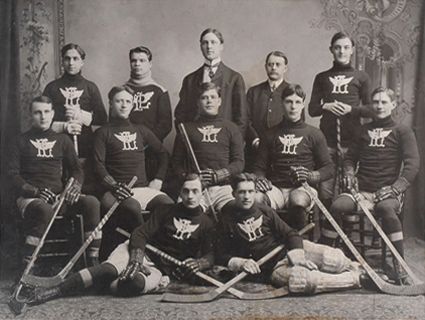
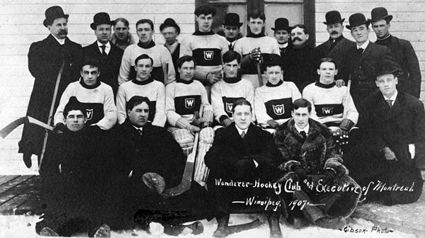
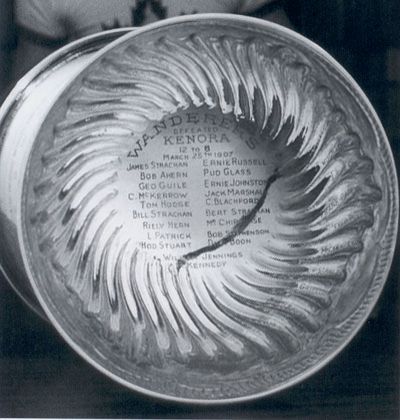
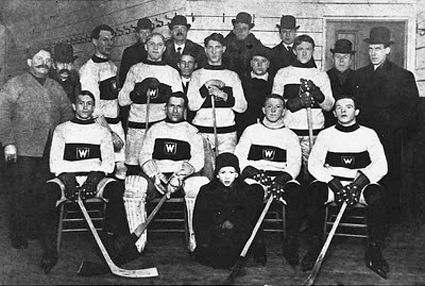
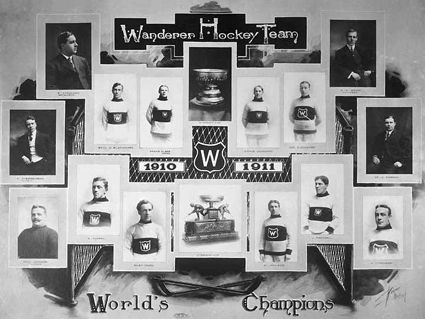
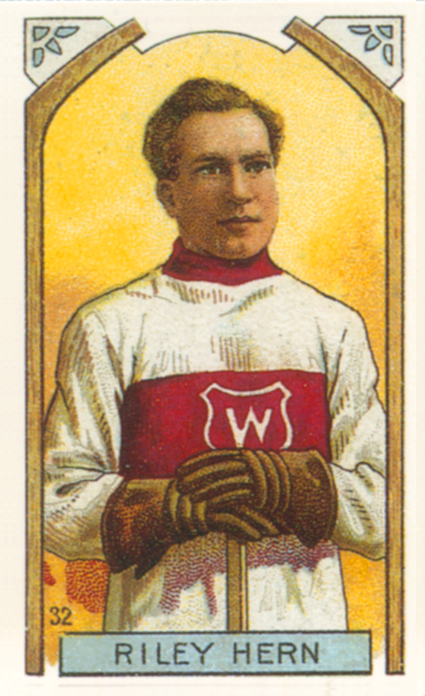










No comments:
Post a Comment
We welcome and encourage genuine comments and corrections from our readers. Please no spam. It will not be approved and never seen.